Once Upon a Time in China II (1992)
Directed by: Tsui Hark
Written by: Tan Cheung, Tin-suen Chan, Tsui Hark
Starring: Donnie Yen, Jet Li, Rosamund Kwan, Siu Chung Mok
AKA WONG FEI HUNG 2: NAM YEE TUNG CHI KEUNG
China/Hong Kong
AVAILABLE ON BLU-RAY: NOW, in EUREKA ENTERTAINMENT’S ‘ONCE UPON A TIME IN CHINA’ BOXSET
RUNNING TIME: 113 mins
REVIEWED BY: Dr Lenera, Official HCF Critic
The situation in China is getting worse. There are protests in the streets against the signing of the Treaty of Shimonoseki [which ended the first Sino-Japanese War and ceded some territories to Japan], while the White Lotus Sect, a fanatical cult, is seeking to drive the Europeans out of China through violence. When the group attacks a school for children to study foreign languages, Wong Fei Hung is obliged to go to the rescue, while also encountering a doctor named Sun Wen who’s part of an underground movement seeking to overthrow the Qing dynasty and establish a republic in China….
Most sensible reviewers are probably reviewing Eureka Entertainment’s Once Upon A Time In China boxset as one write-up with the reviews of each film being quite short, but then I’m not sensible and instead set myself the task of doing each film separately. I will, though, skip the background information paragraph that I like to put in these things for the sequels. This first follow-up is less fight-filled than the first and is more simply plotted, but it manages to continue and develop its themes and some of its characters with no lessening of intelligence and depth. Once Upon A Time In China was very much about a country having its culture increasingly diminished by the white people from various countries who were all out to make money there [the Opium Wars, where England tried to control the drug for profit, remain an especially shameful example of our colonial history]. Once Upon A Time In China 2, possibly or possibly not in answer to criticisms that its predecessor was too nationalistic, is more about the necessity of absorbing foreign influences to keep up in an ever changing world, and portrays xenophobia as just as bad a thing or even worse. The parallels with certain things going on right now are so obvious that it’s not something I feel the need to go into. But this film handles its often thorny issues in a balanced fashion while still remaining tense enough that I didn’t mind the far longer stretches without Wong doing his stuff, though the absence of Yuen Biao does seem to leave a hole in the proceedings. This is especially considering that his replacement Max Mok, despite being in many films, isn’t anywhere near Biao’s caliber as a screen fighter, actor or even comedian despite resorting to mugging most of the time – though even Biao may have struggled with moments like when Foon is visibly turned on by Aunt Yee standing on his shoulders.
The White Lotus Sect is introduced immediately with their leader Kau-kung, who claims he’s a god, getting members to believe that they’re impervious to several forms of pain before exorting them to destroy some foreign artifacts they’ve taken – and a dog. It’s very theatrical, but then that’s probably part of the point. The same title music then follows over the same title images before we rejoin Wong, Aunt Yee and Leung Foon. Previously, Foon and Porky were the sources of comic relief – here, with Porky gone, it’s just Foon. The first scene where we encounter the three has them on a train, and Foon thinks that the train going through a tunnel is a solar eclipse before expressing surprise that it’s able to smash through mountains. Then the three eat a meal with Foon having some trouble eating some soup and a steak. Things from the first film are often continued, such as Aunt Yee’s passion for photography again leading to trouble where, after an encounter with a young White Locus girl who gets a cup bloodily thrown into her face [there’s not much graphic violence in these films but the bits there are often quite shocking], she tries to photograph a White Locus procession and is kidnapped for her trouble, but no matter, Wong is nearby and runs on people’s heads to get to the baddies. His first fight occurs pretty early this time around, but then again this is a shorter film and there was little point in building up to this stuff – though I will warn newcomers to this movie that that’s pretty much it for some time in terms of brawling.
However, things are certainly not boring. Having a group of small children in peril raises the stakes somewhat because it’s usually more upsetting to see kids killed rather than adults, and, while the film then becoming a siege movie makes one miss the variety of settings in the first movie, Arthur Wong’s cinematography really comes into its own with some tremendously evocative, almost noir-like shots, like one of Aunt Yee coming downstairs while the banister and offscreen plants create huge shadows on the wall. The first film became visually darker in its final third, but this one is so throughout, yet does a lot with its mostly muted colour pallet. And then there’s the relationship between Wong and Yee. Does Wong actually see her nudity when he surprises her in the bath? Is he actually moving in to kiss her when she reveals her feelings for him before they’re interrupted? Her imagining their shadows are dancing when Wong gives her some martial arts training, and her face lighting up when he calls her by her real name, are lovely moments. Of course Loon likes her too and Wong shows a childish, jealous side when he punishes Loon for daring to train her himself. Li seems to give a slightly deeper performance than before, and he and Rosamund Kwan certainly have the required chemistry to suggest longing, desire and even love without being able to really put things into practice.
Of course the White Locus Sect are enemies and you know that Wong is eventually going to take them all on with possibly only one companion, another Shaw Brothers mainstay and star of the studio’s collaboration with Hammer The Legend Of The 7 Golden Vampires David Chiang as Lu Hao-dong. Wong’s duel with Kau-kung, who stands atop a huge makeshift altar consisting of loads of tables on each other, is rather spectacular and ends in an especially ironic fashion. Li even gets to show off with the umbrella again. There aren’t really any white bad guys this time – in fact the British let most of the good guys into their embassy which becomes besieged. But there is, of course, Donnie Yen who plays Nap-lan Yun-seut, a military officer trying to catch revolutionaries Sun Wen [aka Sun Yat-sen] and Lu Hao-dong who are plotting to overthrow the Qing dynasty [shades of Project A Part 2, some of this]. Their subplot gives the impression of being awkwardly cut down to very little, and as the film now stands having the man who went on to become the founder of the Republic of China appear in this film doesn’t lead to much except to provide an eventual source of conflict between Wong and Nap-lan, though their first confrontation seems to occur for no reason whatsoever. But for martial arts movie fans it really doesn’t get any better when Li and Yen are on screen duking it out. Their climactic fight, divided into three sections, may be a little short for some but is still one for the ages. When Nap-lan starts fighting with his cloth stick because he realises he’s not quite a match for his opponent with the staff, the adrenalin really kicks in. While four fight choreographers, including Yuen Woo-Ping, handled the more numerous fights in film number one, Yuen took over the job for the sequel. Therefore the fights are more similar and there’s also a bit more wire work throughout. Often of course just simple editing does the trick of convincing someone that, say, Wong can do several kicks at rapid speed while in mid-air. As to why Yen’s close-ups are nearly all photographed from one side, it’s because he was hit by a pole and had to have stitching above his eye.
The previous themes of nationalism and self-strengthening are tweaked to become more an exploration of cultural and ideological tolerance. Easy answers aren’t given except to try to get some kind of balance, and we’re asked to ponder on, for example, how it’s understandable that the White Locus Sect [who appeared in quite a few other films though in real life weren’t quite as vicious or fanatical] could appear considering how China had been exploited and controlled by other countries. Despite the strong political element things never get overly heavy, Hark still out to make a grand entertainment more than anything else, though he’s more ambitious directorially than before. It may not seem like much for us westerners, but the assembly line nature of the cinema within which he worked rarely allowed for scenes like, for example, somebody in a tea house singing a song about wanting to live a peaceful life [before becoming rather incoherent] intercut with violence happening elsewhere. He uses quite a few odd angles too, though there’s far less slow motion in this one though. Yen Shi-kwan, the main baddie from film one, returns as a government official. Both films are crammed full of familiar Hong Kong movie faces. The music is credited to Richard Yuen and Johnny Njo, though most of it is James Wong’s score from before. It’s fine at first, but the majority of the second half of the score consists of the Wong Fei-Hung theme repeated over and over again, even when Wong is healing someone. Jackie Chan sings the vocal version over the end credits.
Matching Once Upon A Time In China was always going to be a very difficult task. Hark, Li and company didn’t quite achieve their objective for Once Upon A Time In China 2, but they obviously gave it their best shot and the result is most certainly not the cheap, rushed knock-off that could have happened. Though maybe a bit low on fighting, the final half an hour more than makes up for this while the film is generally so well made and involving that you probably won’t even care.
Rating: 









Once Upon A Time In China 2 looks every bit as good as Once Upon A Time In China. Despite the large amount of dark and even deliberately murky cinematography, the high level of detail is consistent and there’s very little black crush. Again I went for the Cantonese mono track but some switching back and forth revealed the others to be fine. The newly translated subtitles reveal certain meanings appear to be clearer and even some small bits that weren’t subtitled usually have words to them now. I noticed an interesting detail containing the end version of the song. On the stereo Cantonese track, it runs for a bit longer and the whole song is subtitled.
I enjoyed the audio commentary by Mike Leeder and Arne Venema for the first film so much that I was looking forward to hearing their one for the sequel almost as much as watching the film after some time. And they didn’t disappoint. I can’t say that I agree with them that this is better than its predecessor, though they make such good arguments for their case that I did almost find myself siding with them. Again, the track is light hearted and just fun, but full of information. The film is highly praised but some silly aspects are mentioned too. Leeder worked as a stuntman for this one and makes some very worrying observations about the distinct lack of health and safety on these films. If you were supposed to have a flaming arrow shot at you, you actually had a real flaming arrow shot at you and you either had to get out of the way or hope that the arrow hit the small bit of protective clothing around your chest! We also learn that production was shut down for a few weeks due to conflict between Li, Hark and the studio Golden Harvest, and people worked around the clock to then finish the film in time for the premiere. Leeder appeared as an extra several times in the film, so he has some interesting recollections. Another great track.
Eureka have added another new extra to this particular film, a very lengthy interview with Mike Miller who worked as an extra and a stuntman on the film. It’s very in depth, the man going into detail about the Hong Kong films he’d seen prior to making Once Upon A Time In China 2, Hark and the stars, having a flaming arrow shot at him, and his work afterwards with Hark and on the Once Upon A Time In China TV series. A bit long winded but still worth a listen. Next up is the second part of the The Legend of Wong Fei-hung documentary which visits some Foshan locations, goes into his martial arts development and of how he defeated a very dangerous German Shepherd. The two Hong Kong Legends featurettes consist of Li at a fan convention in 2001 during the release of Romeo Must Die, talking with great enthusiasm but also surprising humility about his move into American movies, and Yen talking about his part in Once Upon A Time In China 2, saying how there was little need for a choreographer when he and Li were doing their fight scenes as they just automatically went for it.
SPECIAL LIMITED EDITION BOXSET
*1080p presentations of all three films, sourced from a brand new 4K restorations and making their UK debuts on Blu-ray
*Original Cantonese audio tracks
*Optional Mandarin and English audio tracks
*Optional English subtitles
*Once Upon a Time in China and America [100 mins, HD] – The final chapter in the Once Upon a Time in China series, with Jet Li making a triumphant return to his most iconic role
PLUS: Collector’s booklets featuring new essays on all four films by James Oliver
ONCE UPON A TIME IN CHINA 2
*Audio commentary from martial arts cinema authority Mike Leeder and filmmaker Arne Venema
*Exclusive new video interview with actor Mike Miller [49 mins]
*The Legend of Wong Fei-hung Part Two [15 mins] – a three-part featurette on the legendary folk hero
*Archival Q&A with Jet Li [10 mins]
*Archival interview with Donnie Yen [15 mins]
*Theatrical trailer
ONCE UPON A TIME IN CHINA 3 review Coming Soon!

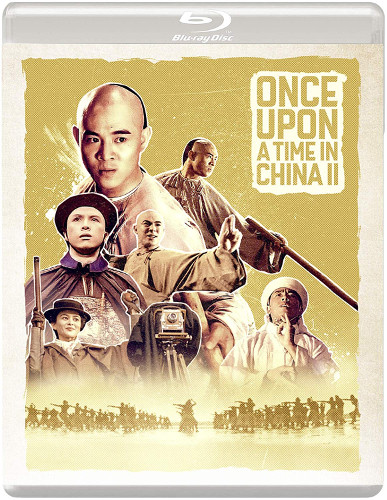
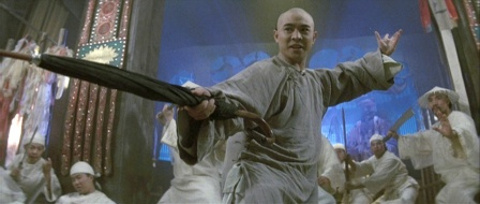
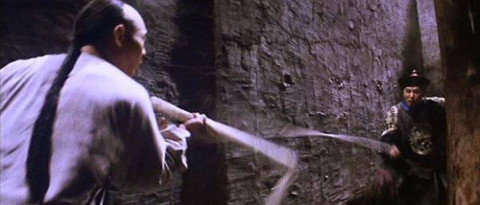
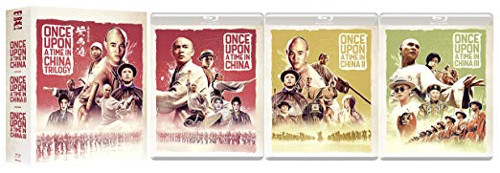

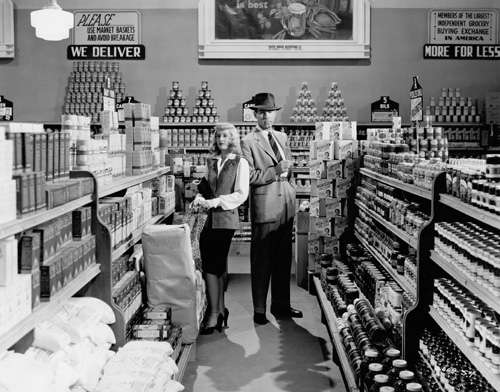
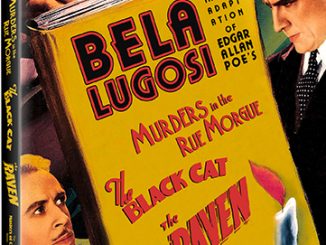
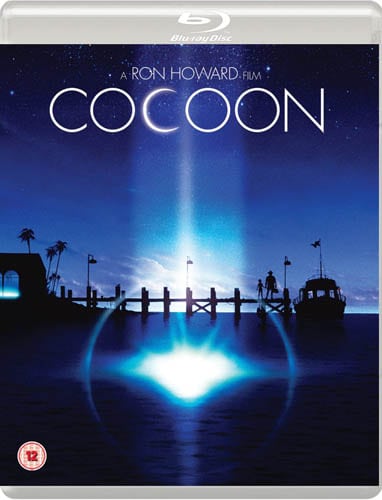
Be the first to comment